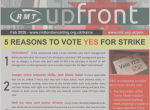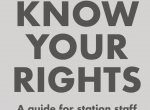- Get the latest stations news on your Ipad here
Similar topics:
Attached documents
- Please download the attached newsletter to read it. You can also print it out to distribute and display in your station.
RMT pressure, at both workplace and Functional level, has resulted in an agreement that all areas must implement local arrangements to revise staff deployment and shift allocation on the basis of emergency BNSs and the reduced service.
We are here to provide a critical service for essential workers. We need a staffing level that allows us to do that safely: there should be no surplus above that level. Management have finally seen sense, and agreed. This is a significant gain for us and opens the door to a form of workers’ control over shift allocation during the pandemic.
WHY WAS THIS NECESSARY? Despite the massively reduced service, Sunday minimum numbers, and essential public health guidance for everyone to stay at home as much as possible, many local managers were still insisting that all staff book on for all duties and stay to time. This was creating an additional public health risk, as it meant safe distancing in the workplace was much harder, and more staff than strictly necessary were having to travel to and from work.
Success in securing this agreement shows the power of our union. Without a majority membership on the job, active reps in every area, and Functional reps negotiating directly with senior management, we would not have been able to bring the necessary pressure to bear.
WHAT DOES IT MEAN? This agreement categorically means that no area should still be requiring all scheduled duties to come in and stay for the duration of the shift.
Ideally we want revised rosters to minimise the number of staff who need to travel in each day. This could be done by rostering additional spare shifts which would only be worked if strictly necessary.
As a minimum we expect all duty lengths to be reduced, to minimise the amount of time people need to spend in the workplace and to maximise distancing.
However, simply reducing duty lengths without attempting to reduce the number of duties still means more staff than strictly necessary will be in the workplace, and traveling to/from work.
Reps and members on every area are strongly encouraged to produced draft revised rosters to facilitate reductions in duties.
If your AM refuses to implement local arrangements to reduce duties/shifts, speak to both your local and Functional reps immediately.
AN EMERGENCY AGREEMENT Arguing for a reduced staffing level, rather than an increased one, is a surreal position for RMT to be in. This agreement does not give management a blank cheque to maintain reduced staffing levels, and has been reached on the explicit understanding that reduced staffing levels will be regularly reviewed and that they will end once the pandemic is over.
At that point, we will resume our campaigning, as part of our “Justice for Station Staff” campaign, for increased staffing levels across the combine. The agreement in full;
“Now that the BNS has been revised to match service levels etc then it’s crucial that reps meet with management to identify the exact number of staff required to maintain safe operation and from that enable either the compilation of a temporary roster or revised local arrangements. It is vital that this work starts as soon as possible and with the following conditions;
The stations BNS is not negotiable and there is no need to exceed the staffing levels identified unless by mutual agreement.
It is anticipated that in most areas this process will allow us to identify a surplus of staff beyond basic operational requirements.
Once that surplus is identified then it will be reflected in new rosters/working arrangements to enable either shorter, or spare, shifts. Equal consideration will be given to part time and Night tube staff.
This idea of the exercise is to enable consistently effective operations while also taking the pressure off stations grades by enabling meaningful work life balance during this difficult time.
Every area must reach a locally agreed way forward and consider any impact on the cover group as a whole.
Any disputes will be resolved at SFC.
This agreement is temporary, subject to review, without prejudice, and will end with the Coronavirus crisis.”
- 2395 reads






